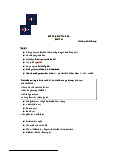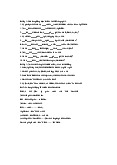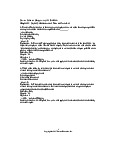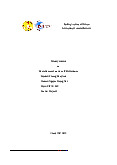


Preview text:
Q2e Reading and Writing 3 Unit 5 Test B
Name: ______________________________________ Date: _____________ Reading and Writing Looking for Excitement Section I
Can you remember how you felt the first time you asked someone out on a date? Was your heart pounding, were
your hands a little shaky, were you in a sweat? Did you go through with it? The signs – or is it symptoms? – of fear
and excitement are very similar: the adrenaline rush, the body’s response to a perceived situation of stress or
danger. It’s a physiological thing, a chemical thing. It would seem we have little say in the matter. Section II
Asking someone on a date you are not risking life and limb, but if you mess it up you may well feel that the
psychological risk – rejection and all the feelings that go with it – outweighs the possible benefits of getting to
know that person. But you did go through with it, and did it again on many other occasions with other people
without, one hopes, losing that tingle of fear or excitement. In fact, without it there wouldn’t be much point, no
“rush”. You learn, I think, to trick your mind into believing that what might be fear is in fact excitement. Whether
or not this is so, there is always a pleasurable sense of daring when you step outside what is called your “comfort zone”. Section III
Occasions to do this present themselves every day and in ordinary circumstances. You don’t have to go in for
extreme sports. You might decide to take on a job with extra responsibilities, so that the buck stops with you, or
give a speech for the first time, or tell your boss what you really think of her. Doing things such as these is largely
beneficial but, as always, there’s another side to it. Many of us take risks that we should know in advance can have
serious negative consequences, if not immediately then in the long term. Section IV
The effects may be seen over some time because these risks often become addictions. Smoking, drinking,
gambling, and overeating spring to mind, but also less seemingly harmful pastimes, like collecting, when they
become obsessions. There’s no excuse for not knowing what harm smoking can do, yet dedicated smokers have
somehow convinced themselves that they’re immune. Gamblers have a different mind-set, more like extreme
sports junkies: imagine betting your house on the turn of a card – imagine the “rush”! Quite possibly losing is as big a kick as winning for them. Section V
We all have some kind of obsession or addiction, however minor, which in the past would have been called a
“weakness for” something, but which these days is called a problem, or even a disease. The suffix –aholic can be
attached to almost anything: we have chocoholics, shopaholics, and so on. The media and lifestyle magazines play
this up and what we thought of as a harmless personality trait becomes something we should feel guilty about.
Guilt, too, has an edge to it. Section VI
The adrenaline rush response was originally used to describe our reaction to sudden, surprising situations – you
are suddenly confronted by a lion in the wild, for example – but now we go looking for it. This should mean that we
have thought a bit about the consequences. Unfortunately, many don’t think far enough ahead and find
themselves hooked, and what once provided kicks becomes routine.
© Oxford University Press. Permission to edit and reproduce for instructional use. 1
Q2e Reading and Writing 3 Unit 5 Test B
Name: ______________________________________ Date: _____________
The reading passage has six sections I V
– I. Choose the most suitable heading for each section II V
– I from the list below. Write the appropriate letter (a–i) for each section. Example Section I Heading: e a. Calculated Risks b. The Mind Playing Tricks c. Go on, You Can Do it
d. Being Brave on a Daily Basis e. Fight or Flight
f. It’s Really a Medical Problem g. It Won’t Happen to Me
h. There’s Nothing You Can Do About it i. What’s Your Problem? 1. Section II Heading: ___ c _ 2. Section III Heading: ___ a _ 3. Section IV Heading: ___ b _ 4. Section V Heading: ___ i _ 5. Section VI Heading: ___ f _
Complete the sentence with the correct word from the word bank:
trait aspect mental challenge precaution
6. She has a unique ____________________ trait
ability to make herself focus only on the present.
7. Staying calm in dangerous situations is a ____________________ challenge for many people.
8. Mountain climbers must take every ____________________ precaution to keep themselves safe.
9. Getting hurt easily is one negative ____________________ aspect of participating in extreme sports.
10. Many extreme athletes share a personality ____________________ mental that lets them enjoy risk.
© Oxford University Press. Permission to edit and reproduce for instructional use. 2
Q2e Reading and Writing 3 Unit 5 Test B
Name: ______________________________________ Date: _____________
Complete the sentence. Choose A, B, or C.
11. There was a _____ amount of snow on the ground, so it was hard to walk. A. significant B. complex C. realistic
12. You need to take _____ before you do a dangerous activity like parachuting. A. role B. precautions C. tolerance 13. I _____ for rude don’t have a lot of behavior. A. tolerance B. bravely C. significant Choose the best response.
14. Choose the sentence that gives background information.
A. About three years ago, I participated in my first marathon.
B. Because of the race, I learned an important lesson.
C. The more prepared I am, the better I will feel.
15. Choose the sentence that describes why the story is important to the author.
A. My mother always told me not to go out late at night.
B. One night, I had a scary experience walking home.
C. I never ignored my mother’s advice again after that scary night.
© Oxford University Press. Permission to edit and reproduce for instructional use. 3




